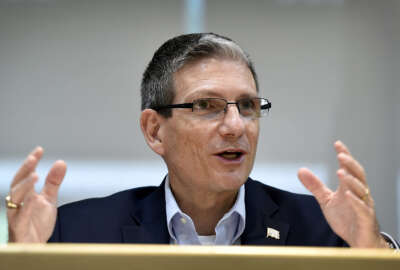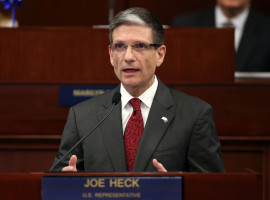
Congressional commission calls for sweeping changes to military, public service programs
The congressionally-mandated National Commission on Military, National and Public Service offered up 124 recommendations Wednesday, which address everything from...
The National Commission on Military, National and Public Service apparently has a knack for raising awareness about its mission during unplanned but pivotal moments of national emergency.
Wednesday marked the second time in two years the commission called for timely improvements to military, national and public service programs — all while many of these government institutions are in the spotlight.
The commission released its interim report last year during the middle of the 35-day government shutdown.
The final report, which the commission issued to Congress and the president earlier this week, comes as the federal government responds to another emergency, a global pandemic.
The report details 124 recommendations aimed at increasing and improving military, national and public service opportunities for Americans.
“As we face this public health emergency we call on Congress and the President to move forward with our recommendations designed to strengthen national preparedness and national mobilization response, ensure the best talent — including those with critical skills — is appointed to federal agencies, and modernize the government systems designed to respond to a crisis, regardless of whether it is man-made or natural,” Joe Heck, the commission’s chairman, said Wednesday in a call with reporters.
Congress tasked an 11-member commission to review the military selective service process and find ways to improve and increase public participation in national and public service programs.
The commission spent two-and-a-half years doing research, holding town halls and discussions in 22 states and collecting nearly 4,300 public comments.
The commissioners’ final report described a lofty goal.
By 2031 — the 70th anniversary of President John Kennedy’s famous “Ask not what your country can do for you; ask what you can do for your country” speech — 5 million Americans will join military, national or public service each year.
In 11 years, more Americans will want to join the military, minimizing the need to recruit so intently, the commission said.
One million more Americans will sign up for AmeriCorps and other federally-funded national service-year programs.
And using revamped hiring procedures and a modern personnel system, agencies will hire more students, interns and young people into federal jobs.
A new Council on Military, National, and Public Service, led by a Senate-confirmed appointee from within the White House, will coordinate these initiatives across government. This leader will have cabinet-level status, the commission suggested.
“In coordinating among agencies, the council would serve as a forum in which federal officials responsible for military, national and public service programs could cooperate and develop interagency, cross-service initiatives,” the commission said. “And because critical skills are developed and used to meet the nation’s needs across all streams of service, the council would act as the interagency lead for identifying and coordinating whole-of-government efforts to address gaps in critical skills that endanger key missions.”
The council would also supervise the creation of a new website, which would serve as a “one-stop-shop” for all military, national and public service opportunities available to the public.
Here are a few other highlights from the commission’s 255-page report.
Military service
Many of the commission’s recommendations focus on increasing the public’s awareness and engagement with the military.
But the flashiest recommendation suggests maintaining the Selective Service System and expanding it to include women in the active registration.
“It came down to whether or not we want standards in our military,” said Debra Wada, the commission’s vice chair on military service. “The commission has found that 29% of men and 29.3% of women are qualified to meet the initial military standards to serve in the military.”
In addition, the commission recommended the creation of an Individual Ready Reserve (IRR), which would allow individuals with critical skills, especially those with tech and cyber expertise, to volunteer for military service.
Though these individuals likely wouldn’t have prior military experience, the Defense Department would work with them prior to a possible deployment to prepare, train and clear them for later service.
“The belief was that there was an opportunity here to bring in non-prior-service [individuals], who may want to volunteer their service in a time of critical need and to be able to provide those skillsets to the department and this nation during that time,” Wada said.
Separately, the commission recommended the creation of a national roster, a database of individuals with special occupations, certifications and other skills.
“Unlike members of an IRR, individuals who chose to join the national roster would not be required to muster, providing a more flexible option for those willing to serve when needed,” the commission’s report reads. “In times of emergency, the nation could rapidly identify high-demand skillsets and call upon those individuals, who in turn would then decide voluntarily whether to meet that call and serve.”
The commission modeled the concept after the National Roster of Scientific and Specialized Personnel, a list of professionals who served during World War II.
Public service
In its opening description on the challenges facing public service the commission offered a dire, direct warning: “The federal civil service personnel systems require urgent attention.”
Federal employees and others in the federal community will recognize of many of the commission’s recommendations to improve public service.
The commission, for example, suggested an overhaul to USAJobs.gov and a revamp of the assessments agencies currently use to qualify job candidates.
Direct hire authorities and non-competitive selections should expand, the commission said.
Notably, the commission also recommended changes to existing veterans preference rules.
“The floating of minimally qualified preference-eligible veterans to the top of the best qualified list results in hiring managers being forced to choose between hiring an individual who is a poor fit for the job, conducting a lengthy pass-over process for each poorly qualified preference-eligible veteran in order to reach a qualified candidate, or simply returning the certification list without making a hire,” the report reads.
Instead, agencies should apply veterans preference only as a “tiebreaker” between qualified candidates, and veterans should have a 10-year limit to use their preference to enter government.
Other recommendations from the commission are relatively bold.
The federal government should set a goal of hiring 30,000 students and recent graduates each year, the commission said. But that target is well above the current reality. New hires of student interns fell from roughly 35,000 in 2010 to 4,000 in 2018, according to the commission.
In the addition, the commission recommended the creation of a “Public Service Corps,” modeled after the Reserve Officers’ Training Corps (ROTC). Agencies could partner with colleges and universities to build a more effective pipeline from school to the federal workforce.
National service
The commission’s other recommendations focus on improving awareness and increasing participation in national service-year programs like AmeriCorps.
Specifically, the commission suggested increasing the number of slots for AmeriCorps and other programs to 1 million participants a year.
AmeriCorps has about 75,000 participants annually.
In addition, the commission recommended increasing cost-of-living stipends for AmeriCorps participants and collecting more detailed information about the demand for these programs.
“Collecting more complete applicant and participant data will help policymakers better understand the demand for AmeriCorps programs and their accessibility to individuals across the socioeconomic spectrum, while enabling the Corporation for National and Community Service to send AmeriCorps alumni a record of completion of national service that includes information on training received and certifications or licenses earned,” the report reads.
Copyright © 2025 Federal News Network. All rights reserved. This website is not intended for users located within the European Economic Area.
Nicole Ogrysko is a reporter for Federal News Network focusing on the federal workforce and federal pay and benefits.
Follow @nogryskoWFED
Related Stories





